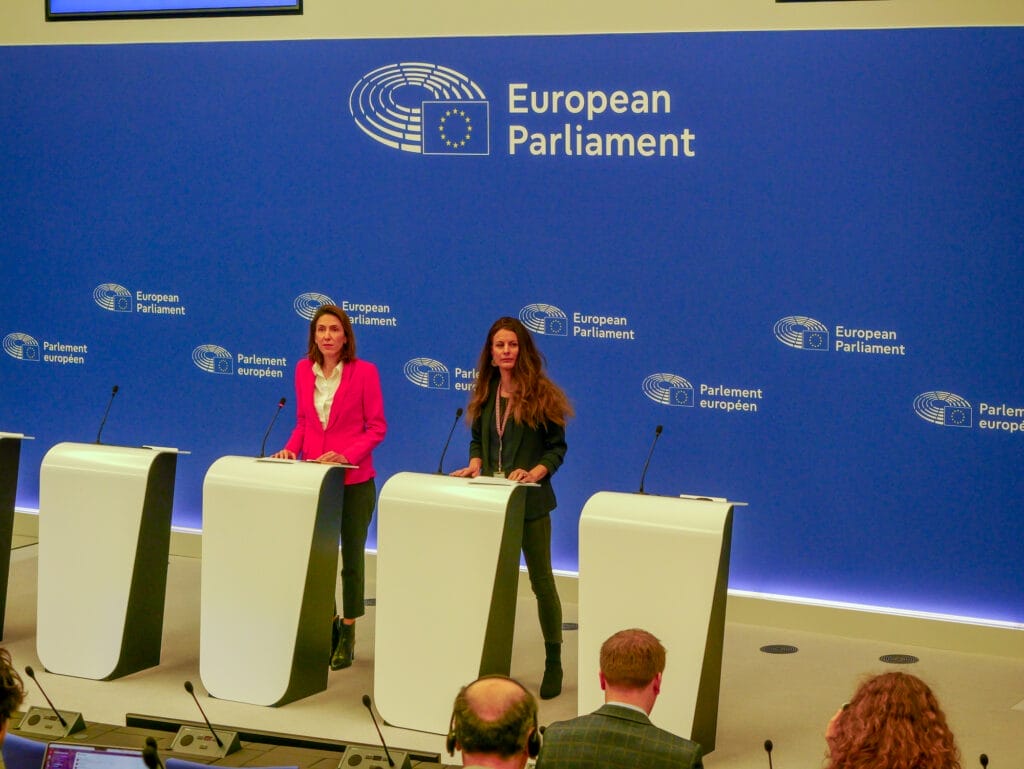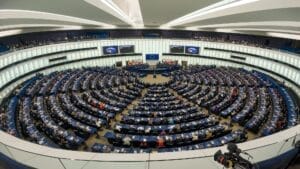Donald Trump and the three tongues of the EU
Donald Trump rages against the European Union as the new US President. While the Council and Commission react in a moderate manner, MEPs are much more self-confident.
The contrast is striking. On Tuesday, numerous Members of the European parliament (MEPs) used their parliamentary start to the year in Strasbourg to comment on the politics of the day. In this case: Donald Trump’s inauguration the previous evening. While they chose harsh words both in the press briefings and in the plenary chamber, the statements of the representatives from the Council and Commission sound much more moderate; in some cases even submissive. This makes the differences between the three institutions all the more apparent.
Council and Commission duck out
As President-in-Office of the Council of the European Union1The Council of the EU is the body in which the national governments of the member states reach agreement. Poland recently took over the presidency. Adam Szłapka sets a clear tone at the start. The Polish Minister for European Affairs begins by invoking joint support for Ukraine, which is under attack from Russia. “The EU and the USA are currently providing the largest share of support,” he emphasizes. However, he prefers to wrap up his admonition to his ally with a benevolent tone, with a view to possible upcoming peace negotiations:
There can be no discussion about Ukraine without Ukraine. We therefore look forward to working closely with the new government on Ukraine to ensure that Russia does not prevail.
While Trump rages against a supposed disadvantage for the USA in trade with the EU, threatening punitive tariffs and risking a trade conflict as a result, Szłapka remains moderately reserved. Instead, he praises the long-standing partnership, which is almost on the brink of collapse: “We have a common interest in expanding our trade and investment relations.”
Instead of an independent European security policy, he speaks of increased transatlantic cooperation in this area. After all, the EU member states would have increased their defense spending by 30 percent between 2021 and 2024. Szłapka’s outlook: “We look forward to working with the new government to strengthen Europe’s security.” The EU is also willing to negotiate on energy issues; Trump is demanding higher purchase volumes of environmentally harmful and expensive liquefied natural gas (LNG), for example – which is likely to result in greater dependency.
Not a word on Trump’s Greenland demand

The words chosen by Maroš Šefčovič sound almost pleading. He ist Commissioner for Trade and Economic Security; Interinstitutional Relations and Transparency since this legislative period 2Put simply, the EU Commission is like a government. It submits legislative proposals to Parliament, monitors their compliance and manages the EU budget. and talks about the historically grown connection: “Following President Trump’s inauguration yesterday, the European Union is therefore ready to deepen and strengthen these important relationships.”
He refers to the priorities for the EU: an inclusive, rules-based multilateral system in line with the principles of the UN Charter. However, he leaves open how this should work in practice if the other party lays claim to the territories of a member state (Greenland) or the Panama Canal. His response to Trump’s “America First” memorandum is accordingly: “We will continue to be a strong partner.” The EU will be “pragmatic”, but will stand by its principles. The clearest criticism remains the “regret” that the USA wants to withdraw from the Paris Climate Agreement.
Sharp tones from the EU Parliament
Some members of the EU Parliament shake their heads in disbelief at such statements. They clearly want a different, more self-confident approach to the increasingly unreliable, aggressive partner, the USA, right across the party spectrum. “We have to prove our strength,” emphasizes Polish MEP Michał Szczerba for the conservative EPP, for example. The EU must also shape its own security and keep its relationship with the USA pragmatic and focused in this respect. He states that the aim of his country’s Council Presidency was to find a common course for this.
Kathleen Van Brempt talks about taking fate into the own hands. “We need to invest in our economy and industries,” says the Belgian MEP from the Social Democratic S&D Group. However, not in the sense of sealing off the EU, but in the search for allies, for example in South America or the Indo-Pacific. In this way, the EU could play to its own strengths and, where necessary, differentiate itself: “The future of Europe is European!”
Europe’s right-wing parties between admiration and rejection
Such statements are likely to be shared in principle by the right-wing EU sceptics of Patriots for Europe (PFE). But with a different twist. “Europe is at a crossroads,” says Jordan Bardella and calls for the Union to free itself from its passive role. Because: “Trump will defend his interests to our detriment.” From his perspective, the new US president is even right, as the USA has been at the mercy of alleged “mass manipulation and globalization” for too long. Europe must return to what the French understands by freedom, identity and sovereignty. He accuses the institutions to which he himself belongs of ideological naivety and too many norms. “Let’s react or we will disappear from history!” is his slogan.

This is how the plenary debate in the EU Parliament in Strasbourg continues to drag on. Representatives of the liberal Renew Group point to the interests of US companies with market access to Europe. “We should use the balance of power, not be weak”, warns Valérie Hayer, for example. The left-wing member Per Clausen is surprised at the Commission’s silence regarding the threats against Greenland. Sergey Lagodinsky emphasizes the continent’s climate-friendly innovative strength. “Shine, baby, shine, he counters Trump’s fossil fuel battle cry: “Drill, baby, drill.”
And on the far right, Stanislav Stoyanov dreams of restoring European dignity with a strong leader and a balance with the US: “The world is changing, and this is a good time for Europe to take a more dignified place on the world stage, as it historically deserves.”
The strategies of the various political groups may reveal major differences. However, it is becoming apparent that one or other conflict between Parliament, the Commission and the Council over the EU’s foreign policy direction is likely to arise.
Transparency note: The EU Parliament financed travel and accommodation to accompany the plenary week on site. This had no influence on the choice of topics and reporting.
Footnotes
- 1The Council of the EU is the body in which the national governments of the member states reach agreement. Poland recently took over the presidency.
- 2Put simply, the EU Commission is like a government. It submits legislative proposals to Parliament, monitors their compliance and manages the EU budget.
Post published on January 24, 2025
Last edited on January 24, 2025
[mc4wp_form id=239488]



Leave a Reply
You must be logged in to post a comment.